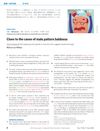Clues to the Cause of Male Pattern Baldness
March 2012
in “
Nature
”
TLDR Targeting a specific lipid could help treat male pattern baldness.
The document discussed a lipid compound that was found to suppress hair growth in both mice and men, suggesting a potential target for treating male pattern baldness. This research provided insights into the biological mechanisms underlying hair loss, indicating that targeting this lipid compound could offer a new approach to managing or reversing baldness. The study highlighted the importance of understanding the role of lipids in hair growth regulation, which could lead to the development of effective treatments for male pattern baldness.







